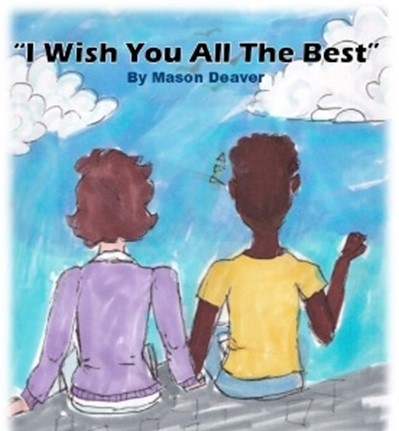Read to Lead – I Wish You All the Best
FAQ: Why do I talk about “X” when I talk about 4-H?

What We Knew
An important part of 4-H is learning by doing and youth cannot learn without safe spaces in which to do so. We observed many people throughout Wisconsin were not aware of or were not comfortable using gender inclusive pronouns. The youth we worked with shared the impact that using (or not using) preferred names and pronouns causes.
There is value in reading books about characters who reflect our own identities. We knew that most books available in libraries and schools are about cis people who identify as straight. To create more welcoming spaces and increase feelings of belonging it would be beneficial for teens and adults who identify as LGBTQ+ to see themselves represented in a book. We believed that people could potentially increase their comfort level with gender inclusive pronouns through reading a book that uses the pronouns they/them appropriately.
What We Did
First, Jasper H started our effort by reviewing their list of books that have LGBTQ+ youth as main characters. They then sent the team the titles of five fictional books for the team to consider. Our team then read the books as individuals and then discussed the advantages and disadvantages of each book. As a team working in Youth-Adult partnership, we decided on the book I Wish You All the Best by Mason Deaver.
Second, we developed a varied marketing strategy with many promotional materials youth created. This included a video and artwork. Everyone who registered for the book group was mailed their own personal hard copy of the book. The purchase of the books was made possible by the WI 4-H Foundation.
Third, we facilitated a four-session book club. Each session of our book read was facilitated by both youth and adults. Each session included:
- a welcome,
- discussion questions (that had been mailed out to participants ahead of time),
- time for reflection
After each session participants received a follow up email with additional resources based on the discussion and reflection questions for the next session.
At our last session we discussed ways we could take action based on our discussions and how we could continue our learning.
Anchor Content
We wanted a book that was engaging and to which WI teens and adults could connect. This included where the characters lived, their school and their family and economic situation. We started with a book list with many genres. The book we ultimately chose was not the first book we selected. We considered the distraction that alcohol, drug use, and sexual references could have on the discussions. We wanted the participants to be able to empathize with the characters in the book.
Taking a Breath
When we are nervous, we may take a deep breath and not realize we are holding it in the whole time. As an exhale, our group encouraged participants to share the hard copy of the book they received when they were finished with it. That could mean a friend or family member or an organization like a library (a little free library or a local public library).
Brave and Safe Space
We started each session with a reminder of our Brave and Safe Space Agreement and the purpose for our time together: “to create a safe space where participants can reflect, ask a question or questions, and listen and seek to understand.”
We started as a large group and then broke into separate breakout rooms for smaller group discussions. Each breakout room always had a facilitator and at least one Extension staff member/trained volunteer.
Taking a Breath
Time for reflection is not always for participants. Sometimes this means for you(th) as a facilitator. Our team found it important to reflect with the participants and then reflect again with only the facilitators. The second reflection helped us talk through any strong feelings that came up for us as individuals who are also learning and provided us with an opportunity to share timely feedback with each other as facilitators.
Youth Empowerment Focus: Critical awareness, Provide opportunities.
Social Justice Principle: Makes identity central, Promotes systemic social change
Further Objectives: True Leaders Part V- Power & Social Justice
Example Documents: Discussion Guide for Week 4
Development Team
Div. of Extension: 4-H LGBTQ+ Champions – Anna DeMers, Luisa Gerasimo, Amy Mangan-Fischer, April Martell, Amber Rehberg, Katie Sepnieski, Sarah Weier
Youth Leaders: Emma, Jasper H, Luca and Oscar
Funded By: Wisconsin 4-H Foundation

